 W
WThe Angolan cave chat is a small passerine bird in the Old World flycatcher family Muscicapidae. It used to be the sole member of the monotypic genus Xenocopsychus but was moved to Cossypha based on the results of a molecular phylogenetic study published in 2010. It occurs locally from western Angola to marginally south of the Kunene River in northern Namibia. Its natural habitat is rocky places in moist to dry savanna. It was previously described as being Near threatened, but has since been downgraded to Least concerned.
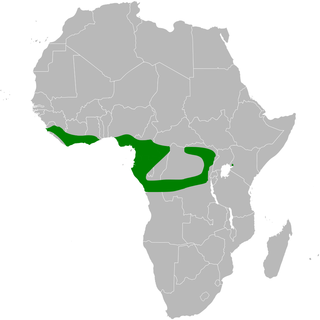 W
WAnsorge's greenbul or Ansorge's bulbul, is a species of the bulbul family of passerine birds. It is found in western and central Africa. Its natural habitat is subtropical or tropical moist lowland forests.
 W
WThe brownish elaenia is a species of bird in the family Tyrannidae, the tyrant flycatchers. It is found along the Amazon Basin rivers of Brazil; also northern Peru and the adjacent border of Colombia; also Bolivia. The rivers are the Xingu, Iriri, Madeira, and Juruá of Brazil, and the Marañón of Peru. Its natural habitat is subtropical or tropical moist lowland forests.
 W
WThe buff-banded tyrannulet is a species of bird in the family Tyrannidae. It is found in Argentina, Bolivia, and Peru. Its natural habitat is subtropical or tropical moist montane forests.
 W
WChapman's swift is a species of swift in the family Apodidae. It is found in Brazil, Colombia, Ecuador, French Guiana, Guyana, Panama, Suriname, Trinidad and Tobago, and Venezuela. Its natural habitats are subtropical or tropical moist lowland forests and heavily degraded former forest.
 W
WThe Costa Rican brushfinch or grey-striped brushfinch is a species of bird in the family Passerellidae. It is found in the undergrowth of humid forest, especially near the edges, at altitudes of 300 to 1,200 metres in Panama and Costa Rica.
 W
WThe comb duck or American comb duck, is an unusual duck, found in tropical wetlands in continental South America south to the Paraguay River region in eastern Paraguay, southeastern Brazil and extreme northeastern Argentina, and as a vagrant on Trinidad.
 W
WThe eastern Canary Islands chiffchaff or Lanzarote Island chiffchaff is an extinct subspecies of the Canary Islands chiffchaff endemic to the island of Lanzarote – and possibly also Fuerteventura – in the Canary Islands, Spain.
 W
WThe Fujian niltava is a species of bird in the family Muscicapidae. It is found in Cambodia, China, Hong Kong, Laos, Thailand, and Vietnam. Its natural habitats are subtropical or tropical moist lowland forest and subtropical or tropical moist montane forest.
 W
WThe green-crowned warbler is a species of leaf warbler. It was formerly included in the "Old World warbler" assemblage.
 W
WThe Humaita antbird is a species of passerine bird in the family Thamnophilidae. It is found in humid forest in the south-western Amazon in Brazil and Bolivia.
 W
WJohannes's tody-tyrant is a species of bird in the family Tyrannidae. It is found in Bolivia, Brazil, Colombia, Ecuador, and Peru. Its natural habitats are subtropical or tropical moist lowland forests and heavily degraded former forest.
 W
WThe lesser grass finch, also known as the grey-cheeked grass-finch, is a species of bird in the family Thraupidae; it was formerly placed in the Emberizidae.
 W
WMcGregor's cuckooshrike or the sharp-tailed cuckooshrike is a species of bird in the family Campephagidae. It is endemic to Mindanao island (Philippines).
 W
WThe olive-backed pipit is a small passerine bird of the pipit (Anthus) genus, which breeds across southern, north central and eastern Asia, as well as in the north-eastern European Russia. It is a long-distance migrant moving in winter to southern Asia and Indonesia. Sometimes it is also called Indian pipit or Hodgson's pipit, as well as tree pipit owing to its resemblance with the tree pipit. However, its back is more olive-toned and less streaked than that species, and its head pattern is different with a better-marked supercilium.
 W
WThe pygmy batis is a very small insectivorous bird which finds its food foraging among leaves, it is a member of the wattle-eyes family, the Platysteiridae. It occurs in the dry savannahs of north-eastern Africa.
 W
WThe Réunion night heron is an extinct species of heron formerly occurring on the Mascarene island of Réunion.
 W
WThe rufous-headed robin is a species of passerine bird in the family Muscicapidae. It is found in central China. Its natural habitats are temperate forests and temperate shrubland. This poorly known species is thought to be threatened by habitat loss.
 W
WThe São Paulo tyrannulet is a species of bird in the family Tyrannidae. It is found in the southern Atlantic Forest. Its natural habitats are subtropical or tropical moist lowland forest and subtropical or tropical moist montane forest. It is threatened by habitat loss.
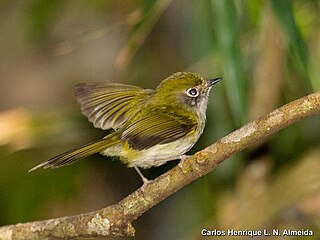 W
WThe Serra do Mar tyrannulet is a small species of bird in the family Tyrannidae. It is endemic to humid montane forest in the Serra do Mar in south-eastern Brazil. More likely confused with the short-tailed and pale-eyed hangnest tody-tyrant than other members of the genus Phylloscartes, its bright olive-green upperparts contrast strongly with the grey underparts. It is generally uncommon and threatened by habitat loss.
 W
WThe Siberian nuthatch is a small passerine bird of the family Sittidae, found in Eastern Siberia. Until 2006, it was usually treated as a subspecies of the Eurasian nuthatch. The split was accepted by the British Ornithologists' Union in 2012.
 W
WSick's swift is a species of swift in the family Apodidae. It was previously considered conspecific with the smaller ashy-tailed swift, but Marín (1997) found that Sick's swift was closer to the chimney swift. It is a migratory species that breeds in central South America and overwinters in northern South America. The IUCN has listed it as being of "Least Concern".
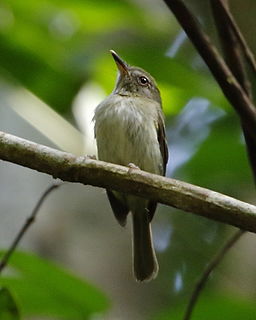 W
WSnethlage's tody-tyrant is a species of bird in the family Tyrannidae. It is found in Bolivia, Brazil, and Venezuela. Its natural habitat is subtropical or tropical moist lowland forests.
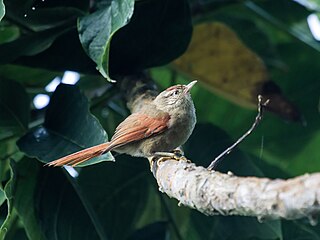 W
WThe streak-capped spinetail is a species of bird in the family Furnariidae. It is endemic to the Sierra Nevada de Santa Marta.
 W
WThe Tasmanian emu is an extinct subspecies of the emu. It was found on Tasmania, where it had become isolated during the Late Pleistocene. As opposed to the other insular emu taxa, the King Island emu and the Kangaroo Island emu, the population on Tasmania was sizable, meaning that there were no marked effects of small population size as in the other two isolates.
 W
WThe Venezuelan tyrannulet is a species of passerine bird in the family Tyrannidae. It is found in northern Venezuela.
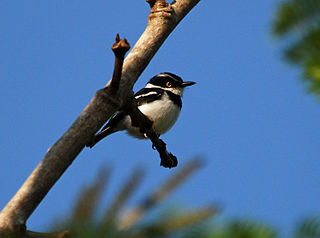 W
WThe western black-headed batis or Von Erlanger's batis, is a species of passerine bird in the wattle-eye family Platysteiridae. It is found over an extensive area of central Africa. Its natural habitats are subtropical or tropical dry forests and moist savanna. It was formerly treated as conspecific with the eastern black-headed batis.
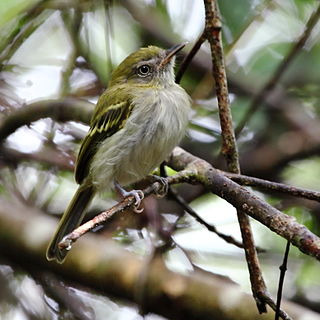 W
WThe white-bellied tody-tyrant is a species of bird in the family Tyrannidae. It is found in Bolivia, Brazil, and Peru. Its natural habitat is subtropical or tropical moist lowland forests.
 W
WThe white-breasted antbird is a species of bird in the family Thamnophilidae. It is endemic to Brazil.